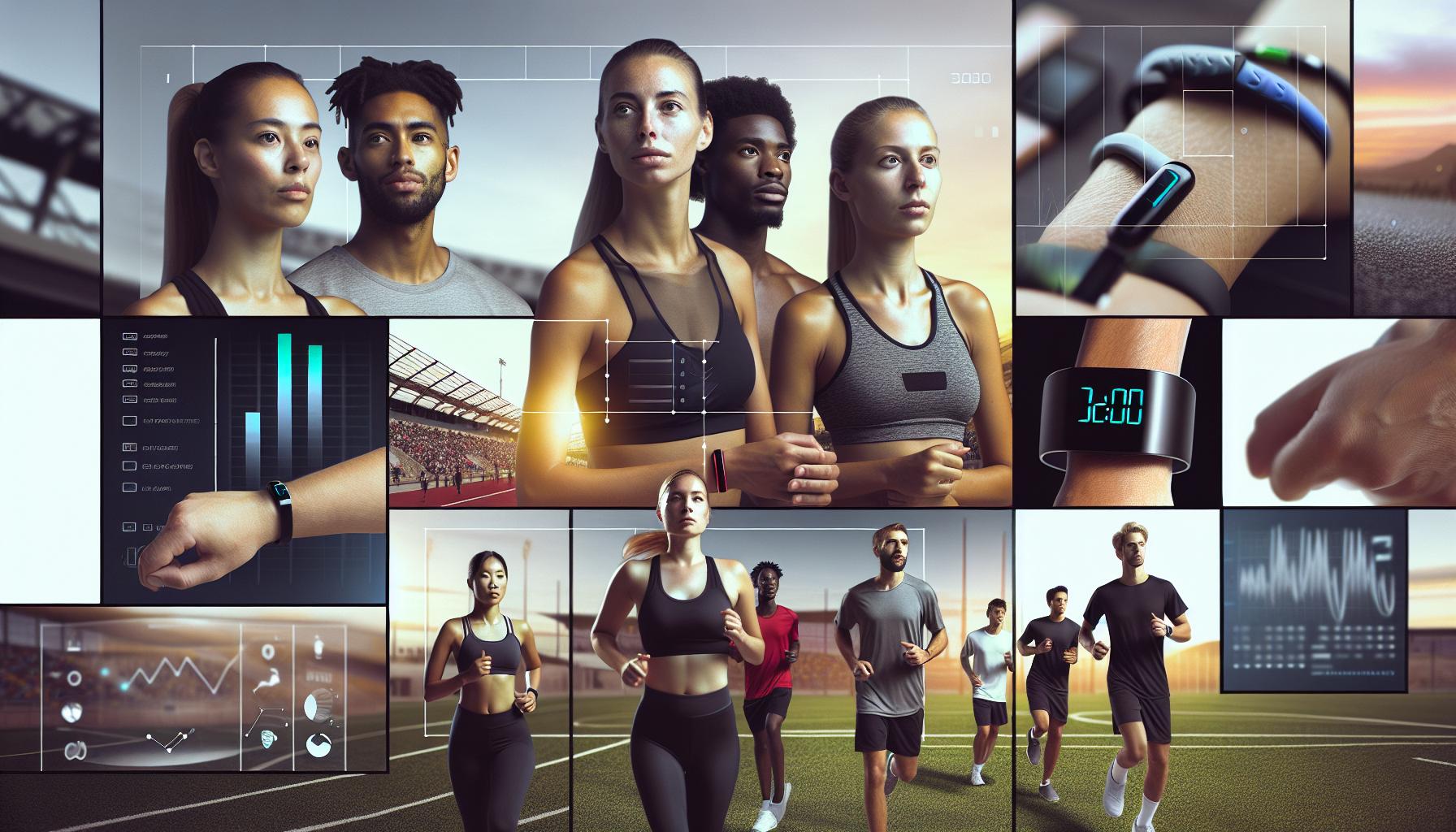In a world where athletes are pushing boundaries and technology is evolving at lightning speed, sports tech news has never been more thrilling. Imagine a future where your favorite player’s performance is tracked in real-time, and wearable gadgets turn every workout into a data-driven masterpiece. It’s not just about the game anymore; it’s about how tech is revolutionizing it.
From smart gear that can predict injuries to apps that turn couch potatoes into fitness fanatics, the latest innovations are changing the way fans engage with sports. And let’s be honest—who wouldn’t want to know how a chip in a shoe can improve a player’s jump? Buckle up as we dive into the fascinating world of sports tech, where every update is a game-changer and the future is just a click away.
Sports Tech News
Sports technology evolves rapidly, impacting both athlete performance and fan interaction. Real-time performance tracking systems enhance training by providing detailed data analytics. Companies design smart wearables to monitor biomechanics, offering insights that can predict injuries.
Apps that promote fitness gain popularity, fostering community engagement through challenges and rewards. These platforms not only motivate individuals but also build lasting connections among users.
Furthermore, virtual and augmented reality applications revolutionize fan experiences at live events. By immersing viewers in the action, fans access unique perspectives not available through traditional broadcasting.
Innovations in analytics also transform coaching strategies. Data-driven decision-making enables coaches to tailor training programs to individual athletes.
New technologies enhance athlete recovery, incorporating tools like cryotherapy and compression therapy gear. These advancements improve overall health and performance, ensuring athletes are game-ready.
Artificial intelligence plays a significant role in sports management, streamlining operations and enhancing security measures during events. Facilities leverage AI to improve spectator experiences, from ticketing to crowd control.
Sports tech news reveals a landscape where technology shapes every facet of sports. With continuous advancements, the integration of tech into sports ensures dynamic growth for athletes and fans alike.
Recent Innovations in Sports Technology

Recent innovations showcase the dynamic progress within sports technology, enhancing both athlete performance and fan interaction. Various cutting-edge solutions emerge regularly, significantly impacting the sports landscape.
Wearable Technology Trends
Wearable technology continues to evolve rapidly, offering athletes real-time data monitoring. Devices like smartwatches and fitness trackers collect metrics such as heart rate and oxygen levels, directly influencing training intensity. Industry leaders, including WHOOP and Fitbit, focus on recovery insights to prevent injuries. Insights from these devices allow for personalized training plans. Enhanced connectivity ensures data transfer between devices and apps, fostering strategic coaching decisions. Additionally, developments in sensors enable better tracking of biomechanics, improving performance evaluations.
Advancements in Training Equipment
Training equipment incorporates advanced technology to optimize athletic performance. Smart basketballs and soccer balls provide instant feedback on techniques, enhancing skill development. Companies like Tonal and Peloton focus on interactive strength training and cardio sessions, engaging athletes from home. Virtual reality platforms simulate challenging environments, preparing athletes for intense competition. Furthermore, advancements in resistance bands and weighted vests cater to varying fitness levels, allowing for customized workouts. Enhanced tracking features contribute to data-driven progress, ensuring athletes meet their targets effectively.
Impact of Sports Tech on Performance

Sports technology significantly influences both athletes and coaches, optimizing performance and enhancing strategic decisions. Innovations have become integral to training and competition, shaping how sports unfold.
Athletes’ Perspective
Athletes leverage wearable devices to monitor heart rates, speed, and recovery metrics in real time. These tools offer insights that refine training protocols and adaptation strategies. Performance data enables athletes to make informed adjustments, maximizing their output. Injury prediction technologies further aid athletes by identifying potential risks, thus facilitating proactive measures. Enhanced feedback loops allow for more tailored training experiences, fostering growth and improvement. Engaging with fitness apps encourages athletes to connect with peers, creating a motivating environment that drives performance.
Coaches’ Insights
Coaches depend on analytics platforms to gain a comprehensive understanding of athlete performance. Data analysis helps craft individualized training plans based on specific metrics. Coaches can analyze game footage in conjunction with performance data, refining strategies as needed. Real-time tracking systems empower coaches to adjust tactics during competitions, improving decision-making. Engaging with technology fosters a collaborative environment between athletes and coaches, enhancing communication and understanding. The use of technology in coaching ultimately streamlines practice sessions, ensuring focused training aligned with performance goals.
Major Players in the Sports Tech Industry

The sports tech industry features a dynamic mix of innovative startups and established corporations driving advancements in technology. These entities enhance athletic performance and engage fans more effectively.
Startups to Watch
AthleteTrax develops real-time tracking systems. This platform helps monitor player performance with precision. Another promising startup, Vert, offers wearable devices focused on jump tracking for basketball players. These tools gather critical data that athletes use to optimize their training. Additionally, WHOOP provides a subscription service that focuses on recovery metrics, enabling users to improve their health through data insights. Such startups represent the future of sports technology, showcasing how innovation can elevate modern training protocols.
Established Corporations
In the realm of established corporations, companies like Adidas and Nike lead the way with smart footwear that analyzes performance. Their products integrate easily with fitness apps for enhanced user experience. Under Armour also emerges as a key player with its connected fitness offerings, including the MyFitnessPal app. This app helps users track their nutrition and exercise, fostering holistic health and fitness. Furthermore, IBM revolutionizes sports analytics with its AI-driven solutions, providing teams with actionable insights for strategy enhancement. These corporations set the standard for technology implementation in sports, shaping tomorrow’s athletic landscape.
Future Predictions in Sports Tech
Emerging technologies are set to revolutionize sports in the coming years. Wearable devices are increasingly becoming integral for performance monitoring, allowing athletes to gather critical data on metrics such as heart rate and fatigue levels. This data will facilitate more personalized training regimens that cater specifically to individual athlete needs.
Ruggedized smart gear is likely to minimize injury risks further, utilizing predictive algorithms to analyze movement patterns and suggest adjustments. Enhanced data processing capabilities will provide coaches with insights derived from comprehensive analytics. Decision-making processes will grow increasingly data-driven, prioritizing real-time analytics during live competitions.
Virtual reality applications will elevate fan engagement to new heights. Fans may experience immersive environments, elevating live events into interactive experiences. Imagine attending a match from the comfort of home while being transported into the action through augmented reality overlays.
Additionally, artificial intelligence will streamline operations within sports organizations. Event management will benefit from AI-driven analytics, improving attendee experiences and enhancing security protocols during large events. Automation technologies could likewise impact team management, facilitating player scouting and contract negotiations.
Recovery technologies are expected to advance significantly, with innovations like sleep monitoring devices and enhanced therapy options. Sleep tracking systems will promote optimal recovery cycles, integrating seamlessly with training regimens. Emerging metrics related to recovery will pave the way for new health standards in athlete care.
E-sports will continue gaining traction, attracting diverse audiences globally. Crossovers with traditional sports could foster growth opportunities, bridging the gap between physical and digital competitions. Technologies designed for e-sports training will also emerge, enhancing skill development and gaming strategies for professional gamers.
As advancements unfold, the sports tech landscape is poised for exciting transformations, shaping the future of athletics and fan interactions.
Conclusion
The landscape of sports technology is evolving at a remarkable pace. Innovations are not only enhancing athletic performance but also enriching the overall fan experience. As wearable devices and smart gear become commonplace, athletes gain unprecedented insights into their training and recovery.
Coaches leverage analytics to fine-tune strategies and improve outcomes. The integration of artificial intelligence and virtual reality further transforms how fans engage with sports. With emerging technologies on the horizon, the future promises even more exciting developments. Sports tech is set to redefine the game, ensuring that both athletes and fans stay connected and engaged in ways previously unimaginable.



